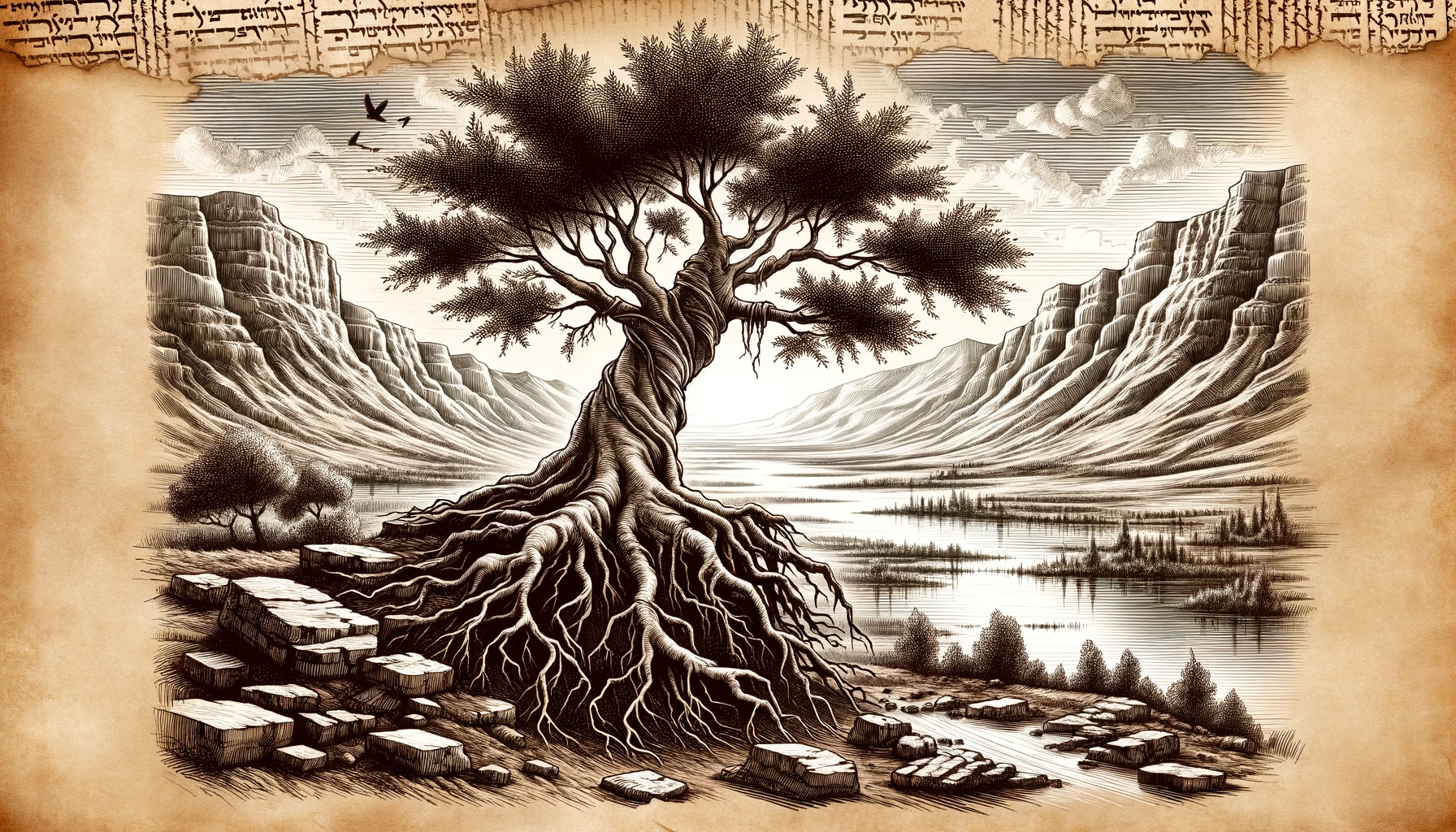In the vast landscape of biblical teachings, the image of an uprooted tree holds profound symbolism. This metaphorical representation serves as a powerful reminder of the consequences of failing to remain grounded in our faith and values.
Just as an uprooted tree loses its stability and nourishment, so too can we lose our spiritual foundation if we neglect to nurture our relationship with God.
Delving into the Old Testament references, parables of Jesus, and spiritual lessons, this article explores the profound meaning of an uprooted tree in the biblical context.
Key Takeaways
- Uprooted trees in the Old Testament symbolize the downfall and consequences of turning away from God’s commands.
- In the teachings of Jesus, uprooted trees serve as a metaphor for the consequences of unfruitfulness and lack of faith in the Kingdom of God.
- Uprooted trees teach spiritual lessons of redemption and restoration for those who turn back to God.
- The biblical symbolism of uprooted trees reminds us of the importance of spiritual fruitfulness and a strong foundation of faith, prompting personal reflection and evaluation of our spiritual lives.
Old Testament References

In the context of biblical interpretation, the uprooted tree is frequently referenced in the Old Testament. The significance of tree symbolism and the interpretation of tree imagery play a crucial role in understanding these references.
One such example is found in the book of Jeremiah, where the prophet uses the image of an uprooted tree to represent the downfall of the kingdom of Judah. This imagery is used to convey a sense of destruction and loss, highlighting the consequences of turning away from God’s commands.
The uprooted tree symbolizes the removal of stability and prosperity, serving as a warning to the Israelites about the dire consequences of disobedience. The Old Testament references to uprooted trees provide a rich and nuanced understanding of the consequences of straying from God’s path.
Uprooted trees aren’t the only type of trees with biblical meanings. Check out the biblical meaning of evergreen trees as well.
Parables and Teachings of Jesus

Jesus used parables and teachings to convey profound spiritual lessons, one of which involves the symbolism of an uprooted tree. Through his parables, Jesus aimed to illuminate the kingdom principles and impart divine wisdom to his disciples and listeners.
The uprooted tree serves as a metaphor for the consequences of unfruitfulness and lack of faith in the Kingdom of God. In Luke 13:6-9, Jesus tells the parable of the barren fig tree, which represents a person or nation that fails to bear fruit in accordance with God’s expectations.
Just as the tree is uprooted due to its unproductiveness, those who do not align themselves with God’s principles and fail to manifest His wisdom will face similar judgment. This parable serves as a powerful reminder of the significance of living a fruitful and faithful life in the Kingdom of God.
Spiritual Lessons From Uprooted Trees
Through the biblical symbolism of an uprooted tree, profound spiritual lessons can be gleaned about the consequences of unfruitfulness and lack of faith in the Kingdom of God. The uprooted tree serves as a metaphor for individuals or communities who fail to bear fruit or exhibit a lack of faith in God.
Just as an uprooted tree loses its stability and ability to thrive, those who lack fruitfulness and faith face dire consequences. However, there is also a lesson to be learned from nature’s resilience. Despite being uprooted, trees have the remarkable ability to regenerate and grow anew.
This resilience points to the possibility of redemption and restoration for those who choose to turn back to God. It is a reminder that even in times of difficulty and upheaval, there is hope for renewal and spiritual growth.
Now that you’ve learned about what uprooted trees mean biblically, you might want to continue learning about the biblical meanings of palm trees, another highly interesting topic to explore.
Application in Our Faith and Daily Lives

One practical way to apply the biblical symbolism of an uprooted tree in our faith and daily lives is by recognizing the potential consequences of spiritual unfruitfulness and the importance of cultivating a strong foundation of faith.
The uprooted tree serves as a powerful reminder of the need for personal reflection and introspection. It prompts us to evaluate our own spiritual lives and consider whether we are bearing fruit or if we have become stagnant.
It also calls us to take practical steps towards nurturing our faith and ensuring that our roots are firmly grounded in God’s Word. This may involve daily prayer and meditation, studying the Scriptures, participating in a faith community, and actively seeking opportunities to serve others.
Frequently Asked Questions
Is There Any Scientific Evidence to Support the Biblical Meaning of an Uprooted Tree?
Scientific evidence in support of the biblical meaning of an uprooted tree is limited. While biblical interpretation suggests that an uprooted tree symbolizes judgment or destruction, scientific research primarily focuses on the ecological and physical causes of uprooting.
Are There Any Specific Prayers or Rituals That Can Be Performed to Prevent Spiritual Uprooting?
Prayers and rituals can provide a sense of spiritual grounding and protection, but their effectiveness in preventing spiritual uprooting lacks scientific evidence. Applying biblical stories and verses, recognizing signs, and implementing prevention techniques can be beneficial in relationships and careers.
Can the Biblical Meaning of an Uprooted Tree Be Applied to Other Aspects of Our Lives, Such as Relationships or Careers?
The biblical meaning of an uprooted tree can be applied to other aspects of our lives, such as relationships or careers. It highlights the impact of uprootedness on mental health and offers lessons for personal growth.
Are There Any Biblical Stories or Verses That Specifically Mention the Consequences of Spiritual Uprooting?
Biblical stories shed light on the consequences of spiritual uprooting. These stories provide valuable insights into the repercussions of straying from one’s spiritual path. Scientific evidence also supports the biblical meaning of an uprooted tree.
How Can We Recognize the Signs of Spiritual Uprooting in Our Own Lives and the Lives of Others?
Recognizing signs of spiritual uprooting involves observing changes in behavior, emotions, and beliefs. These may include loss of motivation, a sense of emptiness, and decreased interest in spiritual practices. Overcoming uprooting requires seeking help, self-reflection, and reconnection with one’s faith.

